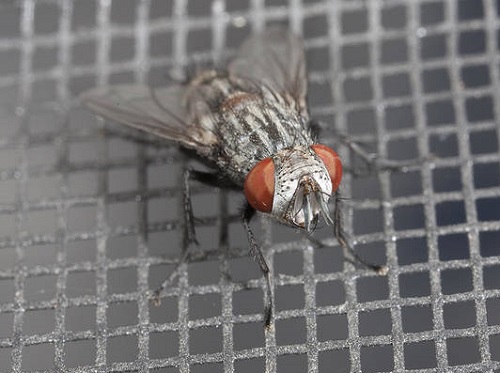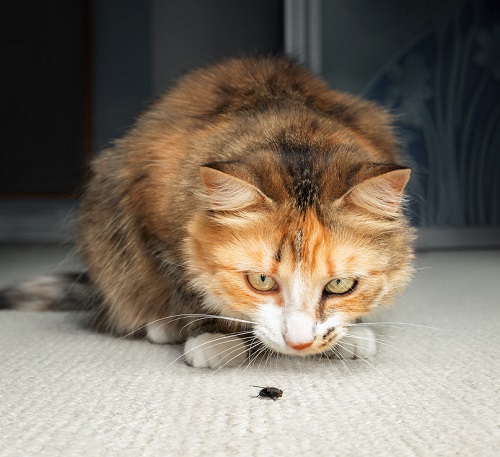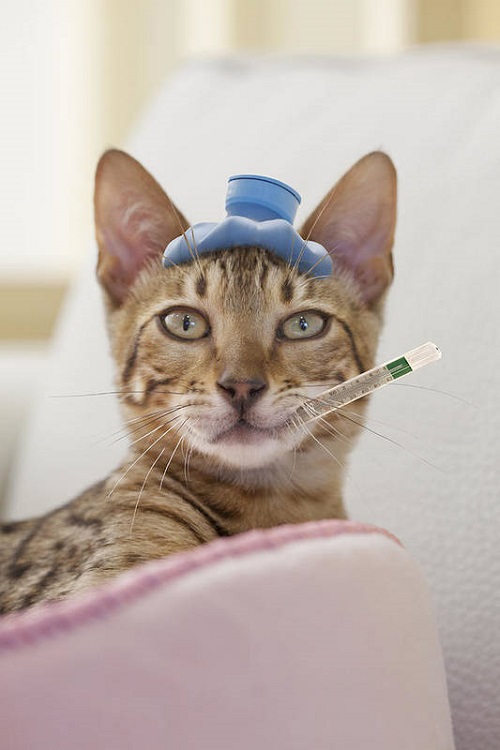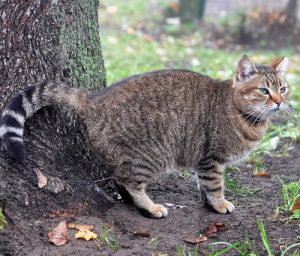Can Cats Eat Flies? Discover whether felines can satisfy their natural hunting instincts by feasting on flies in this informative article.
Cats are notorious for their predatory instincts, often showcasing their hunting prowess by capturing and playing with insects. Flies, with their erratic movements and buzzing sounds, make enticing targets. But Can Cats Eat Flies without experiencing any adverse effects? Stay tuned to know the answer.
Can Cats Eat Roses? Find out here
What are Flies?

Flies are a diverse group of insects characterized by a single pair of wings, a pair of large compound eyes, and mouthparts adapted for sucking or lapping up fluids. They come in various shapes, sizes, and colors, but they are generally known for their agile flight and buzzing sound. Flies play important roles in ecosystems as both pollinators and decomposers. There are different types of flies, such as crane flies, fruit flies, black flies, and house flies.
Can Cats Eat Flies?
Cats can indeed eat flies. Most domestic felines enjoy chasing and sometimes eating small insects such as flies. Generally, eating a fly now and then won’t harm your kitty. While flies themselves aren’t harmful, they can carry parasites or diseases, so it’s best to discourage excessive consumption.
Do Cats Naturally Eat Flies?
Yes, cats have a natural instinct to hunt and capture small moving objects, including flies. Flies mimic the erratic movement of prey, triggering a cat’s predatory instincts. The sight and sound of a fly instantly grab a cat’s attention, making it a tantalizing target for them. Felines may stalk, pounce, and even consume flies as part of their innate hunting behavior.
Why Does My Cat Eat Flies?

Here are some possible reasons why your cat might eat flies, explained in steps:
- Natural Instinct: Cats are instinctive hunters. Their predatory nature drives them to pursue and catch small moving creatures like flies. The sight and buzzing sound of a fly trigger their hunting instincts, making it an irresistible target.
- Stimulation and Entertainment: Chasing and catching flies can provide mental and physical stimulation to your cat. It engages their senses and allows them to exercise their hunting skills. This can be both entertaining and fulfilling for them.
- Prey Drive: Flies resemble prey in terms of their size, movement, and behavior. Cats have an inherent drive to pursue and capture such creatures. Eating flies can be a natural expression of their hunting prowess.
- Playfulness: Cats often view hunting as a form of play. The act of chasing and catching flies can be an enjoyable and interactive game for them.
- Taste and Texture: While flies may not be a staple part of a cat’s diet. Some cats may find the taste and texture of flies intriguing. The act of consuming the fly may be driven by curiosity or the desire to explore new sensations.
Can Cats Get Worms from Eating Flies?
Yes, it is possible for cats to get worms from eating flies. Flies serve as intermediate hosts for various parasitic worms. When a cat ingests a fly that is carrying infective worm larvae, those larvae develop into adult worms within the cat’s digestive system. This lead to worm infestations in felines. Therefore, it’s important to ensure that your cat’s preventive healthcare includes deworming treatments.
Can Cats Get Sick From Eating Flies?
Yes, cats can get sick from eating flies, but the risk is relatively low. However, there can be a risk if the fly is carrying parasites or disease or if it comes into contact with harmful substances like pesticides.
Signs of Sickness in Cats From Ingesting Flies

- Vomiting or regurgitation: Cats may exhibit signs of gastrointestinal upset, such as vomiting or regurgitation, after ingesting flies.
- Diarrhea: Digestive disturbances, including diarrhea, can occur as a result of consuming flies.
- Lethargy: If a kitty becomes sick from eating flies, it displays signs of lethargy, decreased activity, or weakness.
- Loss of appetite: Cats that are feeling unwell may experience a decreased appetite or complete loss of interest in food.
- Abdominal discomfort: Ingesting flies could cause abdominal discomfort or restlessness in felines.
- Changes in behavior: Cats may exhibit changes in behavior, such as increased irritability or seeking isolation when they are feeling sick.
- Weight loss: If fly ingestion leads to ongoing digestive issues or nutrient absorption problems, it could result in weight loss over time.
- Worm infestation symptoms: If the flies ingested by the kitty were carrying parasites, symptoms of a worm infestation, such as a bloated abdomen, weight loss, or the presence of worms in the stool, may be observed.
Can Cats Eat Flies? Quick Takeaways
- The reasons which tempt your fur baby to hunt flies are the following; Natural instinct, stimulation, entertainment, prey drive, playfulness, taste, and texture.
- Cats have a hardy tolerance against being sick from ingesting flies. Until the fly is not contaminated with parasites, it usually doesn’t cause your kitty any harm.
- If you notice worms in your cat’s stool, it’s highly likely that your feline ingested a fly infected with a worm. Seek the help of a vet for further treatment.



